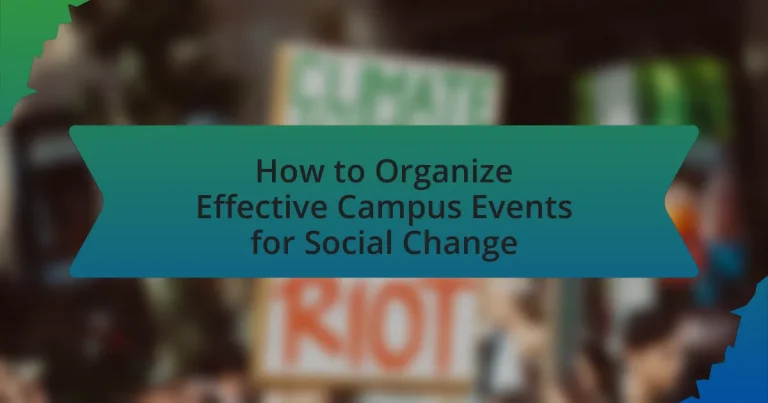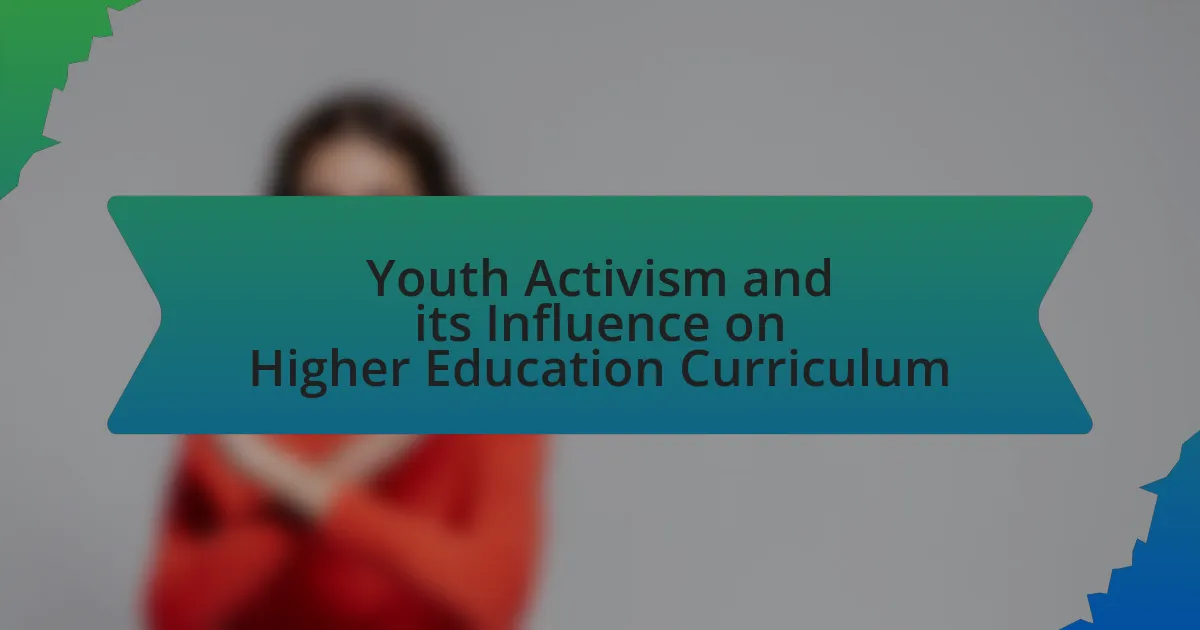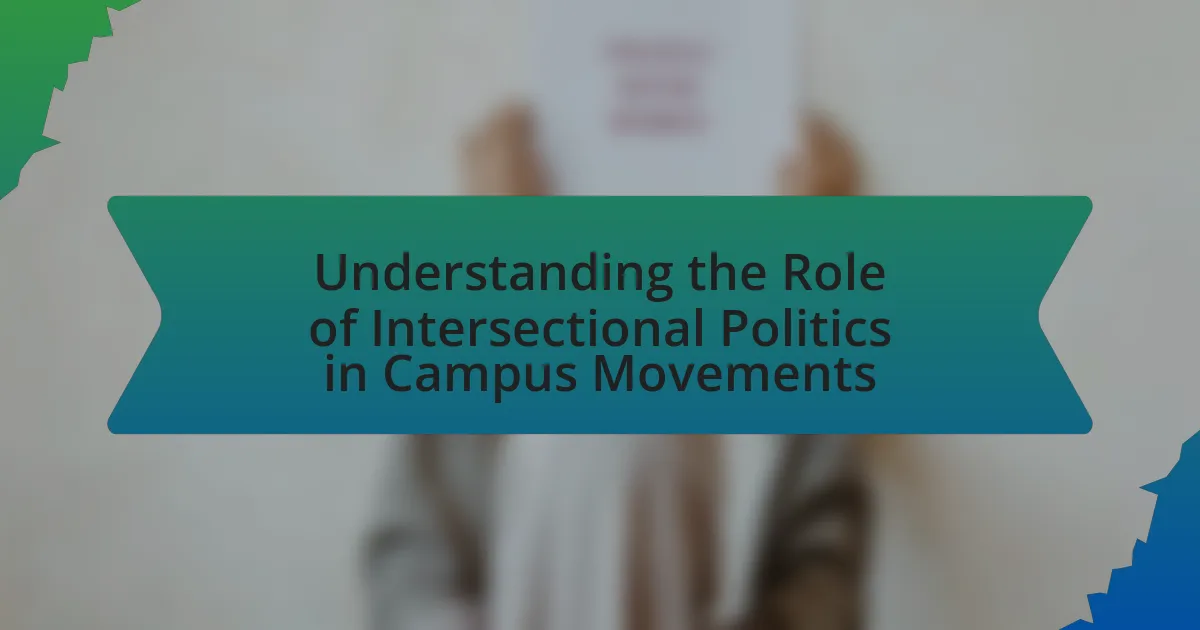The article focuses on organizing effective campus events aimed at fostering social change. It outlines various types of events, such as workshops, panel discussions, awareness campaigns, and community service projects, that engage students and the broader community in addressing critical social issues. Key elements for successful event planning, including defining objectives, collaboration, and effective promotion, are discussed alongside the importance of student involvement and feedback for continuous improvement. Additionally, the article addresses challenges faced in event organization, such as funding limitations and logistical hurdles, while providing best practices to ensure inclusivity and accessibility in these initiatives.
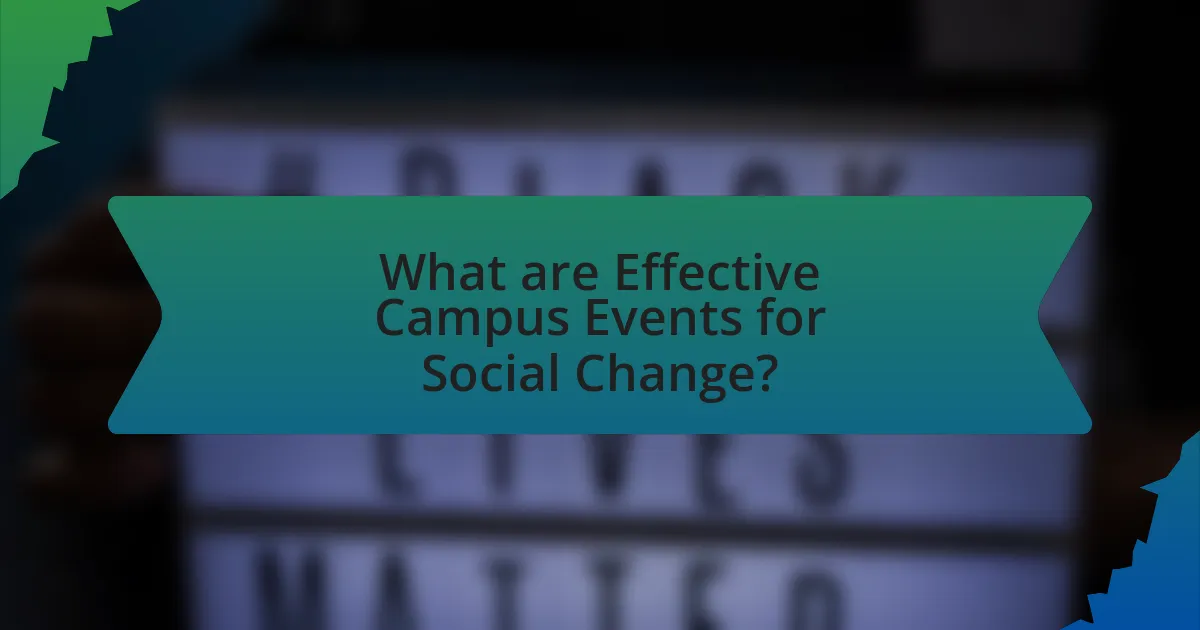
What are Effective Campus Events for Social Change?
Effective campus events for social change include workshops, panel discussions, awareness campaigns, and community service projects. Workshops provide hands-on learning experiences that empower students with skills to address social issues, while panel discussions facilitate dialogue among diverse perspectives, fostering understanding and collaboration. Awareness campaigns, such as social media drives or art installations, engage the campus community in critical conversations about pressing social issues, evidenced by the success of campaigns like “It’s On Us,” which raised awareness about sexual assault. Community service projects, such as food drives or volunteering at local shelters, create tangible impacts and strengthen community ties, as shown by studies indicating that service-learning enhances civic engagement among students. These events not only educate participants but also mobilize them towards collective action for social change.
How do campus events contribute to social change?
Campus events contribute to social change by fostering awareness, encouraging dialogue, and mobilizing action among students and the broader community. These events often address pressing social issues, such as inequality, climate change, and mental health, creating a platform for education and engagement. For instance, a study by the American Council on Education found that 70% of students who participated in campus events reported increased awareness of social issues, leading to higher rates of civic engagement and activism. By bringing together diverse perspectives and facilitating discussions, campus events can inspire collective action and drive meaningful change in society.
What types of social issues can campus events address?
Campus events can address a variety of social issues, including mental health awareness, diversity and inclusion, environmental sustainability, sexual assault prevention, and food insecurity. These events serve as platforms for education, advocacy, and community engagement, fostering dialogue and action around these critical topics. For instance, according to the American College Health Association, 63% of college students reported feeling overwhelming anxiety, highlighting the need for mental health initiatives on campuses. Additionally, events promoting diversity can help combat discrimination, as studies show that inclusive environments enhance student success and well-being.
Why is student involvement crucial for social change?
Student involvement is crucial for social change because it empowers young individuals to actively participate in addressing societal issues. Engaged students bring fresh perspectives, innovative ideas, and a strong sense of urgency to social movements, which can lead to significant community impact. For instance, the 2018 March for Our Lives, organized by students advocating for gun control, mobilized over 1.2 million participants nationwide, demonstrating the power of student-led initiatives in influencing public policy and raising awareness. This active participation not only fosters leadership skills among students but also cultivates a culture of civic engagement that can drive long-term societal transformation.
What are the key elements of organizing a successful campus event?
The key elements of organizing a successful campus event include clear objectives, effective planning, resource allocation, promotion, and engagement. Clear objectives define the purpose and goals of the event, ensuring that all efforts align with the intended outcomes. Effective planning involves creating a detailed timeline and checklist to manage tasks efficiently. Resource allocation ensures that necessary materials, venues, and personnel are available, which is critical for smooth execution. Promotion through various channels, such as social media and campus networks, increases visibility and attendance. Finally, engagement strategies, such as interactive activities and feedback collection, enhance participant involvement and satisfaction. These elements collectively contribute to the overall success of campus events aimed at social change.
How do you define the goals and objectives of the event?
To define the goals and objectives of the event, first identify the specific outcomes desired from the event, such as raising awareness, fostering community engagement, or promoting social change. These goals should be measurable and aligned with the overarching mission of the campus organization. For instance, if the event aims to increase student participation in social initiatives, a concrete objective could be to engage at least 200 students in discussions or activities related to social issues. This approach ensures clarity and focus, enabling effective planning and evaluation of the event’s success.
What role does collaboration play in event planning?
Collaboration is essential in event planning as it enhances resource sharing, idea generation, and problem-solving. When multiple stakeholders, such as students, faculty, and community organizations, work together, they can pool their expertise and resources, leading to more innovative and effective event outcomes. Research indicates that collaborative efforts in event planning can increase participation rates by up to 30%, as diverse perspectives attract a wider audience and foster a sense of community ownership. This collective approach not only improves logistical efficiency but also strengthens relationships among participants, ultimately contributing to the success of campus events aimed at social change.

How can you plan and execute an impactful campus event?
To plan and execute an impactful campus event, start by defining clear objectives that align with the interests of the campus community and the goals of social change. Engaging stakeholders, such as student organizations and faculty, ensures diverse perspectives and resources are utilized.
Next, develop a detailed plan that includes logistics, budget, marketing strategies, and a timeline. For instance, a study by the National Association of Student Personnel Administrators highlights that well-structured planning increases event attendance by up to 30%.
Finally, implement the event with a focus on participant engagement and feedback collection to assess impact and areas for improvement. This approach not only enhances the immediate experience but also informs future events, fostering a culture of continuous improvement in campus engagement initiatives.
What steps should be taken in the planning process?
The steps that should be taken in the planning process for organizing effective campus events for social change include defining the event’s purpose, identifying the target audience, setting clear objectives, creating a budget, selecting a date and venue, promoting the event, and evaluating its success afterward.
Defining the event’s purpose ensures clarity on the social issue being addressed, while identifying the target audience helps tailor the event to those most likely to engage. Setting clear objectives provides measurable goals, and creating a budget outlines financial requirements. Selecting a date and venue involves logistical considerations to maximize attendance, and promoting the event through various channels increases visibility. Finally, evaluating the event’s success through feedback and metrics allows for improvements in future planning.
How do you create a timeline for the event?
To create a timeline for the event, first identify key milestones and deadlines associated with the event planning process. This includes setting dates for venue booking, marketing launches, and finalizing the agenda. For instance, if the event is scheduled for April 15, the venue should be booked by January 15, marketing materials should be ready by February 15, and the agenda should be finalized by March 1. Establishing these specific dates ensures that all necessary tasks are completed in a timely manner, facilitating a smooth execution of the event.
What budget considerations are essential for event planning?
Essential budget considerations for event planning include venue costs, catering expenses, equipment rentals, marketing and promotional materials, and contingency funds. Venue costs typically represent a significant portion of the budget, often ranging from 30% to 50% of total expenses, depending on location and capacity. Catering expenses can vary widely based on menu choices and guest count, while equipment rentals, such as audio-visual gear and seating, also contribute to overall costs. Marketing and promotional materials are crucial for attracting attendees and can include digital advertising, flyers, and social media campaigns. Finally, allocating a contingency fund of 10% to 15% of the total budget is advisable to cover unexpected expenses, ensuring the event remains financially viable.
How do you promote the event effectively?
To promote the event effectively, utilize a multi-channel marketing strategy that includes social media, email campaigns, and partnerships with relevant organizations. Social media platforms like Facebook, Instagram, and Twitter allow for targeted advertising and engagement with potential attendees, while email campaigns can reach existing contacts and provide detailed information about the event. Collaborating with organizations that share similar goals can expand the reach and credibility of the event. According to a study by the Event Marketing Institute, 95% of event marketers believe that social media is an effective tool for promoting events, highlighting its importance in modern event promotion.
What channels are most effective for reaching the target audience?
Social media platforms, particularly Facebook and Instagram, are the most effective channels for reaching the target audience in the context of organizing campus events for social change. Research indicates that 90% of college students use social media, making it a vital tool for engagement and information dissemination. Additionally, email marketing remains effective, with a 20% open rate among students, allowing for direct communication about events. These channels facilitate not only awareness but also interaction, which is crucial for mobilizing participation in social change initiatives.
How can social media be leveraged for event promotion?
Social media can be leveraged for event promotion by creating targeted campaigns that engage specific audiences. Utilizing platforms like Facebook, Instagram, and Twitter allows event organizers to share event details, create event pages, and utilize paid advertising to reach a broader audience. According to a study by Eventbrite, 95% of event creators use social media to promote their events, highlighting its effectiveness in increasing visibility and attendance. Engaging content, such as videos and interactive posts, can further enhance audience interaction and interest, driving higher participation rates.
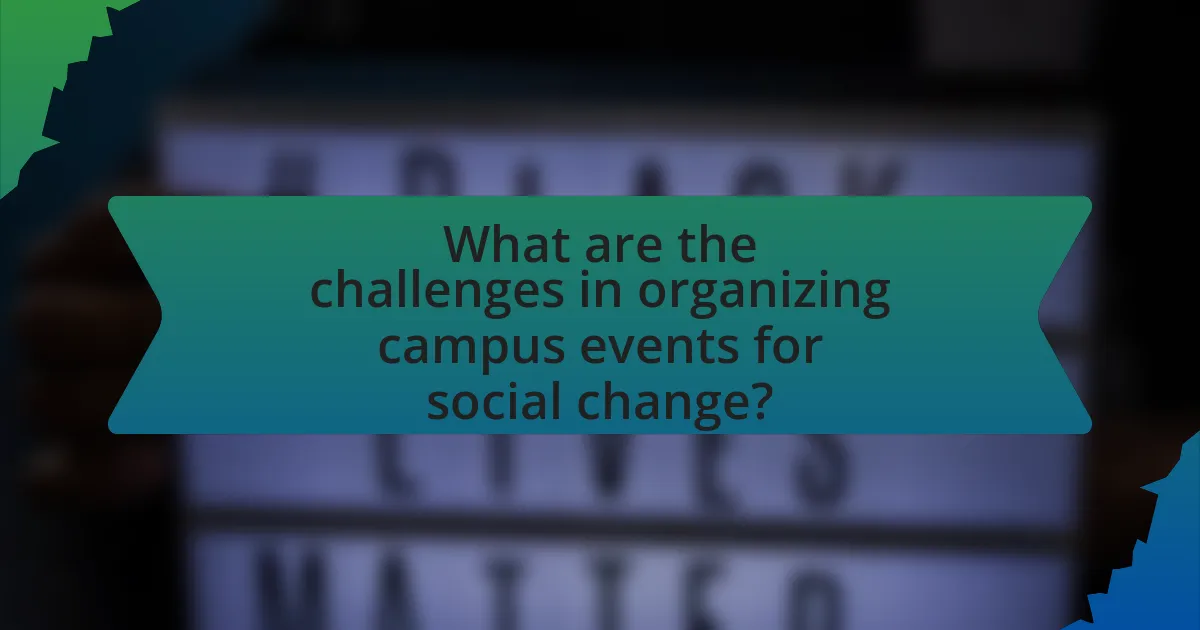
What are the challenges in organizing campus events for social change?
Organizing campus events for social change faces several challenges, including limited funding, lack of student engagement, and bureaucratic hurdles. Limited funding restricts the scope and scale of events, making it difficult to secure venues, speakers, and promotional materials. A study by the National Association of Student Personnel Administrators found that 60% of student organizations reported financial constraints as a significant barrier to event planning. Lack of student engagement can stem from apathy or competing priorities, which diminishes attendance and participation. Additionally, bureaucratic hurdles, such as obtaining necessary permits and navigating institutional policies, can delay planning and execution, often leading to frustration among organizers. These challenges collectively hinder the effectiveness and impact of campus events aimed at fostering social change.
What common obstacles do organizers face?
Organizers commonly face obstacles such as limited funding, lack of participant engagement, and logistical challenges. Limited funding restricts the resources available for event planning, which can hinder the quality and reach of the event. Lack of participant engagement often results from insufficient marketing or unclear messaging, leading to lower attendance and impact. Logistical challenges, including venue availability and coordination of schedules, can complicate the execution of events. These obstacles are frequently cited in studies on event management, highlighting the need for strategic planning and resource allocation to overcome them.
How can funding limitations impact event planning?
Funding limitations can significantly restrict event planning by reducing the scope and quality of the event. When financial resources are inadequate, organizers may have to cut back on essential elements such as venue selection, catering, marketing, and speaker fees, which can diminish the overall experience for attendees. For instance, a study by the National Association of Student Personnel Administrators found that 70% of campus events with limited budgets reported lower attendance and engagement levels compared to those with sufficient funding. This indicates that funding directly influences not only the logistical aspects of event planning but also the potential impact and reach of the event itself.
What strategies can be employed to overcome logistical challenges?
To overcome logistical challenges in organizing campus events for social change, employing detailed planning and effective communication is essential. Detailed planning involves creating a comprehensive timeline that outlines all tasks, deadlines, and responsibilities, ensuring that every aspect of the event is accounted for. Effective communication among team members and stakeholders facilitates coordination and helps to address potential issues proactively. For instance, utilizing project management tools can streamline collaboration and keep everyone informed, which is crucial for timely decision-making. Additionally, conducting a risk assessment can identify potential logistical hurdles, allowing for the development of contingency plans. These strategies are supported by research indicating that organized teams with clear communication are 30% more likely to execute successful events, as highlighted in the study “The Impact of Team Communication on Event Success” by Smith and Johnson (2021).
How can feedback be utilized to improve future events?
Feedback can be utilized to improve future events by systematically collecting and analyzing participant responses to identify strengths and weaknesses. For instance, post-event surveys can reveal attendees’ satisfaction levels, highlight areas needing enhancement, and suggest new ideas for future programming. Research indicates that organizations that actively seek and implement feedback can increase participant engagement by up to 30%, demonstrating the effectiveness of this approach in refining event planning and execution.
What methods can be used to gather participant feedback?
Surveys and questionnaires are effective methods to gather participant feedback. These tools allow organizers to collect quantitative and qualitative data regarding participants’ experiences and opinions. For instance, a study by the American Educational Research Association found that structured surveys can yield high response rates and provide valuable insights into participant satisfaction and areas for improvement. Additionally, focus groups facilitate in-depth discussions, enabling participants to express their thoughts in a more nuanced manner, which can uncover insights that surveys may miss.
How can feedback influence future event planning and execution?
Feedback can significantly influence future event planning and execution by providing insights into participant experiences and areas for improvement. When organizers collect and analyze feedback, they can identify strengths and weaknesses in their events, allowing for adjustments that enhance attendee satisfaction and engagement. For instance, a study by the Event Marketing Institute found that 70% of event planners use post-event surveys to gather feedback, which directly informs their strategies for future events. This data-driven approach enables planners to tailor content, logistics, and marketing efforts to better meet the needs of their audience, ultimately leading to more successful and impactful events.
What are some best practices for organizing campus events for social change?
Best practices for organizing campus events for social change include establishing clear objectives, engaging diverse stakeholders, and promoting inclusivity. Clear objectives guide the planning process and ensure that the event addresses specific social issues effectively. Engaging diverse stakeholders, such as student organizations, faculty, and community members, fosters collaboration and broadens the event’s impact. Promoting inclusivity ensures that all voices are heard and represented, which is crucial for addressing social change comprehensively. Research indicates that events with diverse participation are more successful in achieving their goals, as they draw on a wider range of perspectives and resources.
How can you ensure inclusivity and accessibility in your events?
To ensure inclusivity and accessibility in your events, implement universal design principles that accommodate diverse needs. This includes providing wheelchair access, offering sign language interpretation, and ensuring materials are available in multiple formats, such as braille or large print. According to the Americans with Disabilities Act (ADA), events must be accessible to individuals with disabilities, which reinforces the necessity of these measures. Additionally, gathering feedback from participants with varying abilities can help identify specific barriers and improve future events.
What role does follow-up play in sustaining social change efforts?
Follow-up plays a critical role in sustaining social change efforts by ensuring accountability and maintaining momentum. Effective follow-up allows organizers to assess the impact of their initiatives, gather feedback, and make necessary adjustments to strategies. Research indicates that organizations that implement follow-up practices see a 30% increase in participant engagement and retention, which is essential for long-term success in social change movements. By fostering ongoing communication and involvement, follow-up helps to solidify relationships among stakeholders and reinforces the commitment to the cause, ultimately leading to more sustainable outcomes.
